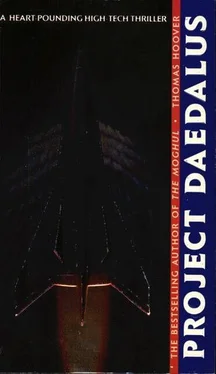Thomas Hoover - Project Daedalus
Здесь есть возможность читать онлайн «Thomas Hoover - Project Daedalus» весь текст электронной книги совершенно бесплатно (целиком полную версию без сокращений). В некоторых случаях можно слушать аудио, скачать через торрент в формате fb2 и присутствует краткое содержание. Жанр: Триллер, на английском языке. Описание произведения, (предисловие) а так же отзывы посетителей доступны на портале библиотеки ЛибКат.
- Название:Project Daedalus
- Автор:
- Жанр:
- Год:неизвестен
- ISBN:нет данных
- Рейтинг книги:5 / 5. Голосов: 1
-
Избранное:Добавить в избранное
- Отзывы:
-
Ваша оценка:
- 100
- 1
- 2
- 3
- 4
- 5
Project Daedalus: краткое содержание, описание и аннотация
Предлагаем к чтению аннотацию, описание, краткое содержание или предисловие (зависит от того, что написал сам автор книги «Project Daedalus»). Если вы не нашли необходимую информацию о книге — напишите в комментариях, мы постараемся отыскать её.
Project Daedalus — читать онлайн бесплатно полную книгу (весь текст) целиком
Ниже представлен текст книги, разбитый по страницам. Система сохранения места последней прочитанной страницы, позволяет с удобством читать онлайн бесплатно книгу «Project Daedalus», без необходимости каждый раз заново искать на чём Вы остановились. Поставьте закладку, и сможете в любой момент перейти на страницу, на которой закончили чтение.
Интервал:
Закладка:
Great. But did the Soviets really know what they were getting into?
The euphoria of the night before was rapidly dissipating. There were too many chances for the plan to slip up. Mike always figured he could play these things close on the wind, tempt fate, but he hadn't always been lucky. Sometimes his luck ran out, and somehow she had a feeling this was about to be one of those times. Tuesday 1:28 P.M.
"Sato-sama, ohayo gozaimasu." Kenji Nogami rose, then bowed low as Jiro Sato and his dark-suited bodyguard were ushered into the Westminster Union Bank's upstairs dining room. The walls were ice gray, with a gold-leafed Momoyama screen depicting a fierce eagle perched on a pine branch mounted on one side. On the other was a modern oil painting, an impressionistic rendering of the rising sun of the Japanese flag. Both were symbols intended to impress Nogami's City guests with Japan's new financial power.
"Ohayo." Jiro Sato nodded lightly in return, signifying his superior rank. In the floor-to-ceiling mirror at the far end of the room his light-grey hair had turned to blue steel in the subdued lighting. It now matched the hardness of his eyes.
Jiro Sato, born in Osaka sixty years ago, was the Mino- gumi's London oyabun, the man in charge. He had lean cheeks and wore a pin-striped suit and dark sunglasses that further camouflaged his already expressionless eyes. His dark felt hat almost looked like a bowler. Although that traditional City headwear was no longer de rigueur in London's financial district, had it been, he most certainly would have worn one. Blending in was what he was all about.
Nogami waited until his guest had settled into one of the molded birch chairs at the end of the long oak table, then he seated himself and clapped for sake. The banker's personal chef, a licensed artisan he had stolen from Tokyo's exclusive Edo Club, was already preparing raw fugu, the sometimes-lethal blowfish, to be served with scorching wasabi on rare Shino ware. It was a Japanese power lunch.
Jiro Sato's career and that of Kenji Nogami had been entwined for thirty years. They had always been in charge of Tanzan Mino's financial matters, had never worked at street level. No tattoos, no missing finger digits. They were part of the brains, not the brawn, of the Mino-gumi.
Although they both knew that a certain bond issue of a hundred billion Eurodollars was the purpose of the luncheon, they gave no hint as their traditional small talk began with saucers of sake and a learned discussion of the Momoyama screen on the wall, thought to have been commissioned by the shogun Toyotomi Hideyoshi at the end of the sixteenth century. From there their chat expanded to the glories of Momoyama art, then the "nightingale" floors of Shogun Hideyoshi's Kyoto palace-beveled boards designed to announce silent intruders-and finally to Hideyoshi's betrayal at the hands of Ieyasu Tokugawa. The oblique topics were standard, the Japanese way of beginning a business meeting.
Jiro Sato's official position was CEO of the London-based Nippon Shipbuilding Company. In that role he supervised the Mino-gumi's London interests with an iron hand, as was expected by those who served him, and by his superiors in Tokyo. Nippon Shipbuilding built no ships, nor had it for twenty years. Instead it laundered Tanzan Mino's hot money. Funds flashed daily over the satellite link from Tokyo, and investments ranged from real estate to British gilts to the most arcane products of the financial markets.
Money laundering was but the latest enterprise of the Yakuza, an ancient brotherhood rooted in over three hundred years of Japanese history. The kana symbols for the syllables Ya-Ku-Za were the same as those for the numbers eight, nine, and three-a total of twenty, which was a losing number in Japanese gaming. The losers: that was what the Japanese underworld, with ironic humility, had chosen to call itself. In earlier centuries the Yakuza were carnival operators, gamblers, fast-moving purveyors of questionable wares. They also took it upon themselves to be a kind of private militia, protecting a defenseless citizenry from the predations of aristocratic warlords. They were, in their own minds at least, Robin Hoods who championed the common man, while also, not incidentally, catering to his penchant for entertainment, excitement, and sin.
These days the Yakuza considered themselves the last heirs of the samurai, but they still supplied escapism, be it in the form of nightclubs, gambling, or amphetamines. And in so doing they had grown fabulously rich. Jiro Sato's job in London was to reinvest and clean a portion of that wealth.
Nippon Shipbuilding was headquartered in an eight- story building in the new Docklands redevelopment, yet another expensive architectural nonentity in that multi-billion-dollar new city on the banks of the Thames downriver from the financial district. It was, in many ways, the perfect location for a Yakuza beachhead. Unlike the older parts of London, Docklands was ready-made for the parvenu, since everything there was new and anonymous, yet it stood only minutes away from the City-the best of both worlds. The London operation was going well, and with the recent construction of their new Docklands financial complex, at a cost of fifty million pounds sterling, matters were on a solid footing.
Jiro Sato's relations with Kenji Nogami had, until today, been conducted within the strict social dictates of Yakuza etiquette. As the London oyabun, he had, in fact, bent the rules in journeying into the City for their meeting today. Convention required that Nogami should have come to him. However, a recent turn of events necessitated a new concern with discretion. A muckraking series in the Telegraph two months before had accused the Nippon Shipbuilding Company of being an organized-crime front. Consequently he now had to take pains not to connect his own operations with the workings of Westminster Union. It was better all around if Kenji Nogami were not seen entering the Docklands office by some snooping newspaper hack. Nogami was a useful asset who needed to be kept above press speculation.
Also, Jiro Sato was beginning to wonder if the banker would actually have come. Kenji Nogami was rapidly losing touch with the old ways.
None of this would ever have been known from the light talk at lunch. It was only when the meal was over, and the staffers had discreetly absented themselves with deep bows, that things finally got down to matters at hand. But even then, as tradition required, the opening was Japanese and indirect.
"Nogami-san," Sato Jiro said as he leaned back and reached for his fifth go of sake, "do you recall the famous story comparing the three great shoguns who ruled during that unsettled period surrounding the Momoyama? The tale says they each were once asked what they would do if they had a nightingale who refused to sing."
Nogami nodded and sipped from his sake saucer. Of course he knew the story. Every Japanese did.
"You doubtless recall that Ieyasu Tokugawa replied, 'I will merely wait until it does sing.' He was a patient man. Toyotomi Hideyoshi, by contrast, said he would prefer to try and reason with the bird, hoping to convince it to sing." He paused and smiled. "Sometimes gentle persuasion does work. But the great warlord Oda Nobunaga declared he would just ring the wretched creature's neck. He had no patience with disobedience."
"Perhaps Ieyasu Tokugawa's answer was the wisest, Sato-sama." The banker's eyes were defiant.
"He also enjoyed the luxury of time, Nogami-san. I suppose the pace of affairs was more leisurely back then." Sato set down his black raku sake saucer and lit a Peace cigarette, the unfiltered Japanese brand. "These days events do not always allow us such luxuries, no matter how much we might wish it. Sometimes it is necessary to proceed forcefully."
Читать дальшеИнтервал:
Закладка:
Похожие книги на «Project Daedalus»
Представляем Вашему вниманию похожие книги на «Project Daedalus» списком для выбора. Мы отобрали схожую по названию и смыслу литературу в надежде предоставить читателям больше вариантов отыскать новые, интересные, ещё непрочитанные произведения.
Обсуждение, отзывы о книге «Project Daedalus» и просто собственные мнения читателей. Оставьте ваши комментарии, напишите, что Вы думаете о произведении, его смысле или главных героях. Укажите что конкретно понравилось, а что нет, и почему Вы так считаете.












